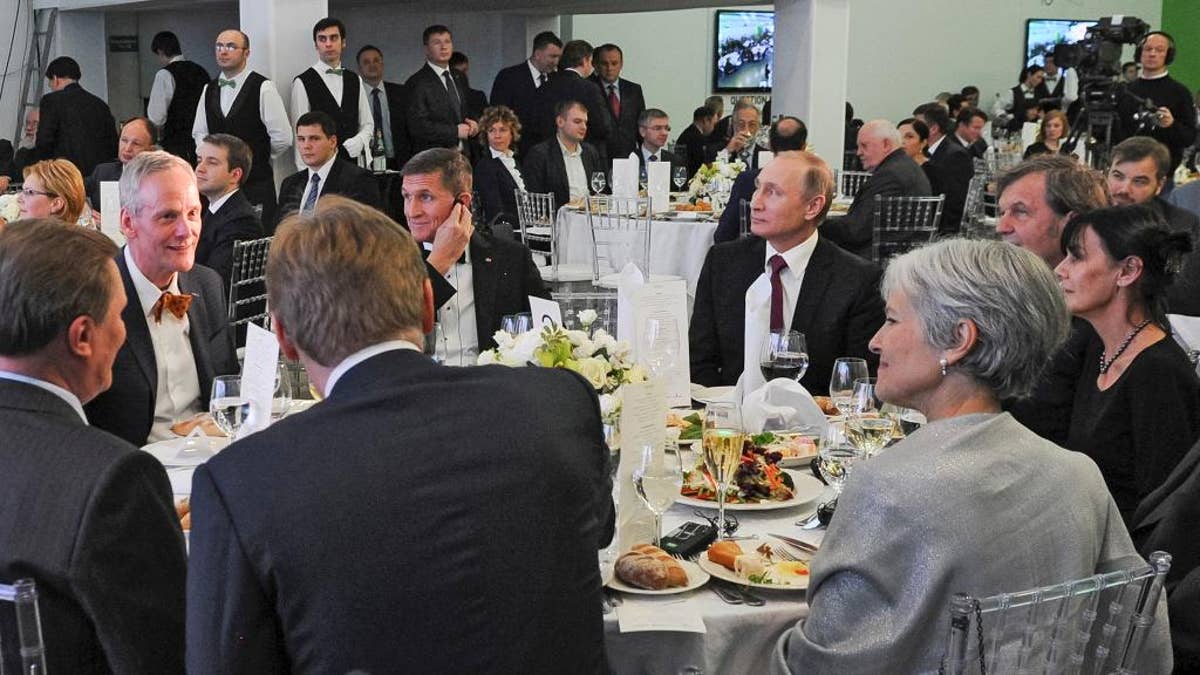
FILE- In this file photo taken on Thursday, Dec. 10, 2015, Russian President Vladimir Putin, center right, with retired U.S. Lt. Gen. Michael T. Flynn, center left, and Serbian filmmaker Emir Kusturica, obscured second right, attend an exhibition marking the 10th anniversary of RT (Russia Today) 24-hour English-language TV news channel in Moscow, Russia. Flynn is widely reported Thursday Nov. 17, 2016, to be a potential contender to become national security advisor to U.S. president elect Donald Trump, although his appointment may be controversial. (Mikhail Klimentyev/Sputnik, Kremlin Pool Photo via AP, file) (The Associated Press)
WASHINGTON – Michael Flynn, the former Army lieutenant general Donald Trump has asked to be his national security adviser, rose through the ranks of military intelligence on the strength of his reputation as an astute professional and an unconventional thinker. After retiring in 2014, he quickly turned on the Obama administration and accused it of being soft on terrorism.
In recent public comments, including his fiery address at the Republican National Convention, Flynn has emphasized his view that Islamic State extremists pose an existential threat on a global scale, demanding a far more aggressive U.S. military campaign against the group, as well as his belief that Washington should work more closely with Moscow.
Flynn is a champion of other foreign policy themes Trump pushed during the campaign, including renegotiating a seven-country agreement with Iran aimed at curbing its nuclear program in exchange for a lifting of economic sanctions.
He has also stirred controversy with his dire warnings about the dangers of Islamist groups, complaining on CNN in June that the U.S. needs to "discredit" radical Islam, but that "we're not allowed to do that right now." He accused the Obama administration in July of failing to design a coherent strategy for opposing the Islamic State group. In August he spoke at an event in Dallas for the anti-Islamist group Act for America, saying that Islam "is a political ideology" and that it "definitely hides behind being a religion."
Flynn's dark warnings have not extended to the Islamist-leaning authoritarian Turkish government headed by President Recep Tayyip Erdogan. In an op-ed for the Washington newspaper The Hill just before the election, Flynn wrote that Turkey needs support and echoed Erdogan's warnings that a "shady" Turkish Muslim cleric living in Pennsylvania should not be given safe harbor in the U.S.
Erdogan has accused the cleric, Fethullah Gullen, of orchestrating an attempted military coup in the July and called for his extradition. The Obama administration has not complied.
Flynn's warmth toward Russia and antagonism toward what conservatives call "radical Islam" have worried some national security experts. Flynn traveled last year to Moscow, where he joined Russian President Vladimir Putin and other Russian officials in a celebration of the RT network, a Russian government-controlled television channel. Flynn later explained that he had been paid for taking part in the event, but brushed aside concerns that he was aiding a Russian propaganda effort.
As Trump's national security adviser, Flynn would not require Senate confirmation.
Flynn, who turns 58 in December, is a native of Middletown, Rhode Island. He graduated from the University of Rhode Island in 1981 with a degree in management science and was commissioned a second lieutenant in military intelligence. He held various positions in military intelligence throughout his career, including director of intelligence for the Joint Chiefs of Staff, and the top intelligence officer for the commander of the U.S.-led international military coalition in Afghanistan in 2009-10.
He drew public attention in January 2010, during his time in Afghanistan, for his unorthodox decision to have a Washington think tank, the Center for a New American Security, publish his critique of the U.S. intelligence system in Afghanistan.
After he announced in April 2014 that he would step down as director of the DIA, Flynn asserted he had been forced out because he disagreed with the Obama administration's approach to combating extremism. His critics, however, claimed he had mismanaged the agency and that his efforts to force change were met with internal resistance.
With his public and fervent support for Trump, highlighted by his July convention appearance, Flynn challenged the military's apolitical traditions. He was not alone. John Allen, a retired Marine general, spoke at the Democratic National Convention as a Clinton supporter. Their former colleague, retired Gen. Martin Dempsey, wrote in The Washington Post that Flynn and Allen were wrong to do so.
"The military is not a political prize," Dempsey wrote. "The American people should not wonder where their military leaders draw the line between military advice and political preference."
Flynn would not be the first retired general to be asked to serve as part of a president's national security team. Obama appointed retired Army Gen. David Petraeus as CIA director in 2011.
___
Associated Press writers Stephen Braun and Julie Pace contributed to the report.

